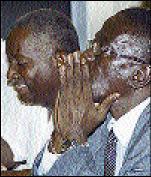Earl Moxam, Senior Gleaner Writer

The NWU's Vincent Morrison (left) and Dwight Nelson of the BITU side by side at salary negotiations in 2005. - File
A MAJOR split in the country's trade union movement appears likely in the wake of thecontentious general election campaign.
Senator Dwight Nelson, vice-president of the Bustamante Industrial Trade Union (BITU) to the Jamaica Labour Party (JLP), has told The Gleaner that his union is likely to distance itself from the National Workers' Union (NWU), affiliated to the People's National Party (PNP), after the election.
To give full effect to that separation, he said the BITU was seriously considering withdrawing from the Jamaica Confederation of Trade Unions (JCTU).
"We are going to teach the NWU a lesson!" Senator Nelson promised.
"Let them go! They won't be missed!" was the sharp response of Vincent Morrison, president of the NWU.
Ironically, Senator Nelson is the current president of the JCTU, the umbrella organisation representing the interests of most unions.
Describing the NWU's support of the PNP in the election campaign as "vulgar", he said this was a departure from traditional practice whereby the two unions refrain from direct involvement in their political allies' election campaigns.
In the final week of this election campaign, the NWU sponsored a television commercial in which it took direct aim at comments made by Opposition Leader Bruce Golding in the National Political Debates.
In that commercial, the NWU condemned Golding for contrasting Jamaica's economic growth rate with higher trends achieved in Asian countries such as Vietnam and Cambodia.
Those superior results, the union argues, have been garnered at the expense of worker rights as prescribed by the International Labour Organisation.
The NWU is also reading comments by Audley Shaw, Opposition Spokesman on Finance, on the International Monetary Fund (IMF) as a promise, under a JLP administration, to return Jamaica to a relationship with that institution, the nature of which would see the IMF dictating policies inimical to the interests of Jamaican workers.
That has been denied by Senator Nelson, however, who claims that Shaw did clarify the JLP's position on the IMF in discussions with the NWU. Accordingly, he said it was dishonest for the NWU to continue using this issue as a point of contention.
Morrison, in turn, is charging that the BITU "has always found it difficult to take an independent position separate from that taken by the JLP".
On the other hand, he claimed the NWU's positions enunciated in the campaign commercial were arrived at without any influence from the PNP.
The BITU was established by Sir Alexander Bustamante in 1938 at th of country's political awakening. Sir Alexander was also a founding member of the PNP, formed that same year. Five years later, in 1943, he left the PNP and founded the JLP.
The PNP maintained a close relationship with the Trade Union Congress (TUC) until the expulsion of 'The Five Hs' - members of the so-called radical left - from the party in 1952.
In April that year the NWU was formed as an affiliate of the PNP, giving the party much-needed credentials with the working class in the wake of the split.
Years of bitter rivalry between the NWU and the BITU for members eventually gave way to peaceful collaboration and a no-raid pact, largely influenced by Michael Manley of the NWU and Hugh Shearer of the BITU.
Both men went on to become serious political rivals and serve as Prime Ministers but kept their union rivalry in check while maintaining a deep personal friendship.
Their collaboration eventually resulted in the establishment of the Joint Trade Unions Research and Development Centre (JTURDC) in 1980, with funding from the government of Norway.
The JCTU is today's successor to the JTURDC.
earl.moxam@gleanerjm.com

